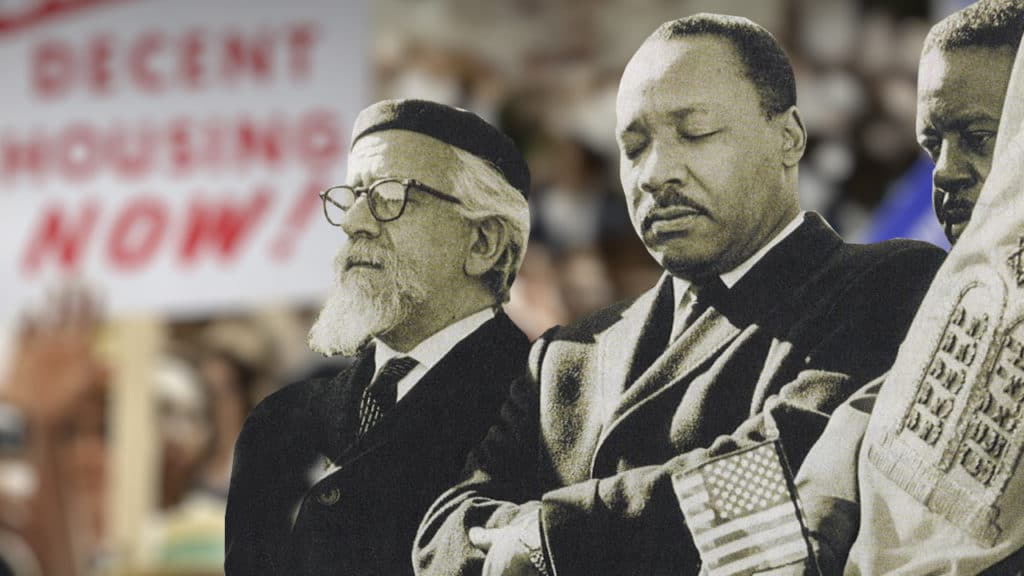Rev. Dr. Martin Luther King, Jr. is a defining figure of US history. Arguably the most impactful activist for civil rights, he was a leader who dreamed of letting freedom ring for all Americans regardless of race.
His legacy of change through nonviolence and civil disobedience is well known, but what many don’t know about is King’s close relationship with the Jewish community of his day. Through his tumultuous battles for civil rights in the 1950s and 60s, King allied with many leading Jewish figures.
“Letter from a Birmingham Jail”
On April 12, 1963, King was imprisoned for protesting racism and racial segregation in Alabama. While awaiting bail, he penned his famous “Letter From a Birmingham Jail.” He wrote it in response to a letter from local white ministers, who criticized King’s decision to protest in Birmingham.
In the letter, the jailed minister conveyed his reasons for showing up in Birmingham. He explained that he was there because injustice was there. He famously wrote that white moderates “prefer a negative peace which is the absence of tension to a positive peace which is the presence of justice.”
This idea parallels a quote attributed to Hillel the Elder about the idea of a rodef shalom, one who pursues peace:
“Hillel used to say: be of the disciples of Aaron, loving peace and pursuing peace, loving mankind and drawing them close to the Torah.” (Pirkei Avot/Ethics of the Fathers 1:12).
Rabbis who fought for civil rights in America
One person who embodied “rodef shalom” was Rabbi Joachim Prinz, a contemporary and friend of Dr. King.
Having witnessed the horrors of Nazi Germany prior to his emigration to the US, Prinz was intimately familiar with prejudice and hate, which galvanized him to fight for civil rights. He advocated for racial equality and was critical of American Jews who were apathetic to the cause.
At the March on Washington in August 1963, Prinz spoke immediately before King delivered his famous “I Have A Dream” speech.
He invoked the Jewish people’s origins as slaves, adding that when God created man, “He made him as everyone’s neighbor with…a collective responsibility for the preservation of man’s dignity and integrity.”
King echoed this a few minutes later when he preached that one of the main goals of his movement was to “transform the jangling discords of our nation into a beautiful symphony of brotherhood.”
Rabbi Abraham Joshua Heschel, a theologian and professor at the Jewish Theological Seminary, was another friend of Dr. King. Heschel joined King in numerous speeches and protests. At one point, he called King “the voice of God in our time.”
After walking with King and other religious leaders in the 1965 Selma to Montgomery March for voting rights, Heschel described the trek as spiritually moving, like he was “praying with his legs.”
King’s connections with the Jewish community

King also used his global influence to help the Jewish community. He frequently chastised the Soviet government for its treatment of its Jewish citizens, and co-sponsored conferences on the plight of Soviet Jewry.
In 1965, the American Jewish Committee awarded King the American Liberties Medallion for his “exceptional advancement of the principles of human liberty.” Throughout his life, King fought against antisemitism, including within the Black community.
He was also a friend to Israel. In a 1968 speech, King called Israel “one of the great outposts of democracy in the world.”
Following King’s tragic assassination in Memphis in 1968, the Jewish community mourned deeply with the rest of the country. On the day King’s body was laid to rest, over 700 Jewish schools and organizations across the country closed out of respect. Jewish leaders around the world spoke of his stunning legacy.
King’s support of the Jewish community reflected his principles of helping one’s brothers and sisters. This is also a Jewish value of caring for the stranger (ger). King’s values of community, education, justice, and reaching out to one’s neighbors continue to resonate.
In his ongoing fight for justice, King transcended divisions to work with different communities, religions, and races. His pursuit of a union that benefits all resonates with American Jews today, who live in a society that still strains under racism, antisemitism, and political division.
